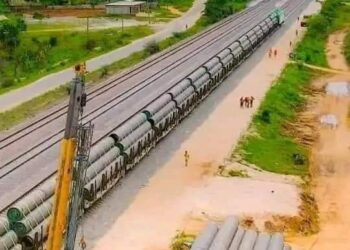The election last week of President Muhammadu Buhari as the Chairman of the Authority of Heads of State and Government of the Economic Community of West African States (ECOWAS) is a welcome development as it is a good omen for Nigeria in particular and the sub-region in general.
Buhari’s emergence, indeed, underscores the confidence reposed in him owing to his sterling leadership qualities.
President Buhari’s election was one of the highpoints of the 53rd Session of the Authority of Heads of State and Government of ECOWAS which held in Lome, Togo.
Buhari took over from the Togolese President Faure Gnassingbe, who was chairman from June 2017 to July 30, 2018.
The Togolese president took over from the former Liberian president Ellen Johnson Sirleaf.
Buhari, according to a statement by his Senior Special Assistant, Media and Publicity, Malam Garba Shehu, commended his colleagues for his election saying he did not offer himself for the post, “but you refused to take my no for an answer.” He, however, told his colleagues that, “I am truly humbled and pledge to serve and work with all of you to deliver on peace, security, good governance and socio-economic development” of the subregion, and “take our organisation to greater heights.” Buhari also commended his immediate predecessor, President Gnassingbe, for successfully hosting two important meetings of the Joint Economic Community of Central African States (ECCAS) and ECOWAS, as well as the 53rd Ordinary Session of the Authority of Heads of State and Government of ECOWAS.
He was presented with the Emblem of ECOWAS by the outgoing chairman, while the next meeting of the organisation would take place in Abuja on December 21, 2018.
The Authority of Heads of State and Government of Member States is the supreme institution of the ECOWAS and is composed of heads of state and/or government of member states.
Buhari’s election is significant in many respects.
First, is the fact that the Nigerian president, who has chaired the organization in the past, will be running for a second term in office in February next year.
Secondly, Nigeria has produced three ECOWAS chairmen in the last eight years and almost every Nigerian leader has chaired the ECOWAS (with Buhari on the helm of affairs in 1985 when he was then military head of state).
Third is the fact that Nigeria’s general elections are around the corner.
It is instructive that ECOWAS was formed in 1975 in Lagos, Nigeria with 15 countries.
The 15 comprise five Anglophone countries and 10 Francophone countries.
ECOWAS Treaty was signed in Lagos on May 28, 1975 to harmonize relationship within member states which was gradually designed for the establishment of customs union and harmonization of economic and financial policies.
Monetary policies were used to streamline industrial policy and master plan, in addition to provide funds for the poor countries of the region.
President Buhari, who will oversee the affairs of the organisation for a period of one year, is expected to work with the Authority to determine the general policy and major guidelines of the community and give directives.
He will ensure harmonious relationship among the member states as well as oversee the functioning of community institutions and follow-up implementation of community objectives; prepare and adopt its rules of procedure.
He will also work with the Authority to harmonise and co-ordinate the economic, scientific, technical, cultural and social policies of member states.
As the chairman, Nigerian Buhari will convene an extraordinary session of the Authority or at the request of a member state provided that such a request is supported by a simple majority of the member states.
The Authority meets at least once a year in ordinary session.
This is no mean task for a sub-region that is grappling with multifaceted challenges since its inception 43 years ago.
These include terrorism, pastoralists’ crisis, piracy, drug trafficking, oil bunkering, human trafficking, trade imbalance and the yet to be resolved issue of a single currency.
Although much achievements may have been recorded in the area of democracy with peaceful elections in Nigeria, Benin, Niger, Cote d’Ivoire, among others, it behooves on Buhari who made history by defeating then incumbent President Goodluck Jonathan to become Nigeria’s president in 2015 to ensure free, fair and credible elections in Nigeria next, year.
This is the burden the ECOWAS leadership has placed on him, considering that Buhari is running for a second term.
We wish Buhari well as he steers the ship of ECOWAS towards regional integration and prosperity
Blueprint gives you the latest Nigerian news in one place. Read the news behind the news on burning National issues, Kannywood, Videos and the Military



